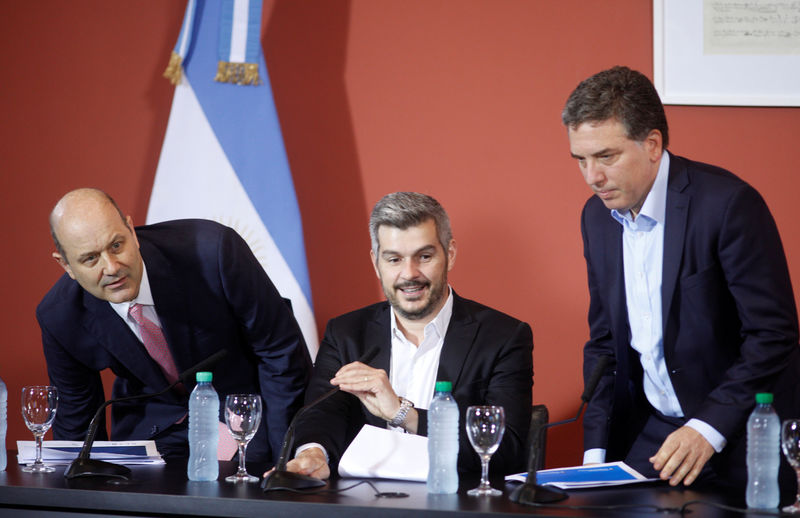 © Reuters. Argentina’s Cabinet Chief Pena, accompanied by Minister of the Treasury Dujovne and Argentine Central Bank Governor Sturzenegger attend a news conference at the Casa Rosada Presidential Palace in Buenos Aires
© Reuters. Argentina’s Cabinet Chief Pena, accompanied by Minister of the Treasury Dujovne and Argentine Central Bank Governor Sturzenegger attend a news conference at the Casa Rosada Presidential Palace in Buenos AiresBy Jorge Otaola and Luc Cohen
BUENOS AIRES (Reuters) – Argentina changed its inflation target for 2018 to 15 percent, up from the central bank’s previous goal of 8-12 percent, Treasury Minister Nicolas Dujovne said on Thursday, raising expectations for interest rate cuts.
The government will postpone by one year its goal of lowering inflation to 5 percent, pushing it back to 2020, Dujovne said. The 2019 target will be 10 percent. Consumer prices rose 21 percent in the first 11 months of 2017, above the central bank target for 12-17 percent inflation for the year.
The shift in next year’s inflation target brought it closer to market expectations of 16.6 percent. It prompted a 3.18 percent drop in the peso currency
The bank has hiked its policy rate to 28.75 percent this year to fight inflation, prompting concerns that rising financing costs could stifle growth.
“This change of the target allows us to recalibrate that monetary policy, because now it has to be oriented toward achieving the 15 percent target, not 10 percent,” central bank Governor Federico Sturzenegger said at a conference.
The change came as President Mauricio Macri’s government planned further cuts to utilities and transportation subsidies, which will help cut the primary fiscal deficit to 3.2 percent of gross domestic product (GDP) next year but will contribute to inflation by hiking consumers’ fees.
Lower inflation is a key element of Macri’s plan to attract investment and boost growth to an expected 3.5 percent next year. His tax and pension overhauls recently passed Congress despite harsh opposition criticism, and cabinet chief Marcos Pena said on Thursday Congress would take up labor and capital markets reform legislation in February.
“It is not good news that they could not comply with the target, but it is good that the government recognized it,” said Alfredo Blanco, an economist at the University of Cordoba. “Otherwise, it would have kept insisting on an unreachable goal for next year, submitting the economy to unnecessary stress.”
The central bank will now likely cut its benchmark interest rate by at least 100 basis points in January, and lower it to 21.25 percent by the end of 2018, Alejo Costa, head strategist at BTG Pactual, said in a note.
A Treasury Ministry source said the change would give the central bank “more flexibility” with interest rates, and that the new levels would provide a more realistic starting point for upcoming annual salary negotiations.
“The targets had lost credibility, so they no longer served to anchor expectations,” said the source.
In order to continue fighting inflation, Sturzenegger said the central bank needed to keep reducing transfers to the executive branch to help finance its deficit. Dujovne said the primary fiscal deficit target would fall to 1.2 percent of GDP by 2020, down from 4.2 percent of GDP this year.
The central bank will transfer $7.3 billion to the Treasury in 2018 and $3.3 billion in 2019, Finance Minister Luis Caputo said. He added that total financing needs are $30.1 billion next year and $26.1 billion in 2019.
Source: Investing.com




























